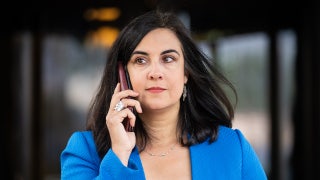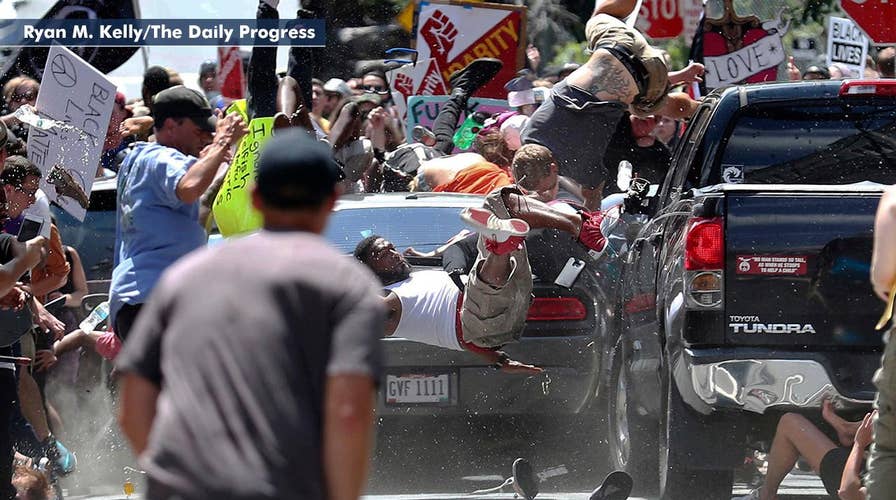Hate-crime charges filed in Charlottesville car attack
Charlottesville car attack suspect facing more than two-dozen federal hate-crime charges.
For the people of Charlottesville, Virginia, Aug. 12, 2017 – one year ago this weekend – is a day we will never forget.
That weekend, a large group of white supremacists descended on our city for the now infamous Unite the Right rally. They spewed racial slurs and Nazi slogans while carrying banners covered in swastikas.
Protesters and counter protesters faced one another just a couple of miles from the school where my congregation would meet for church the next day.
Suddenly, our city had become a battlefield.
I was horrified when I received the news that a man had driven a car into the crowd, killing 32-year-old Heather Heyer and injuring many others.
That night I struggled with how to address my congregation. I remember feeling so overwhelmed – what could I possibly say? How could I encourage our church to help push back the darkness in our city?
The next morning as I prayed, the message I needed to preach became clear: White supremacy, white nationalism, anti-Semitism, and all forms of racism are evil and sinful. These evil ideologies do not represent the heart of Jesus or his teachings.
Racism is not an issue of politics, nor can it be handled passively. Our only hope is the transforming power of Jesus Christ.
In the year since the riots, I have had the privilege of taking part in Gospel-based discussions and conferences on race. It is vital for American churches to cross racial and social lines and begin learning from one another.
Here are four lessons I have learned since Aug. 12, 2017:
We must repent of our own racism.
The events of a year ago brought the discussion of race, elitism and white supremacy front and center. It’s something we can’t ignore because it exists, even within the church.
Each one of us must examine his or her own heart for any hint of hatred toward another person and call it what it is. It’s sin. Before we can begin to talk about racial reconciliation, we must repent of the bias within ourselves.
However, there’s hope. The Apostle Paul – the man considered the most influential Christian in history – confessed a hatred that used to exist in his heart toward the followers of Jesus.
But when Paul met Christ on the road to Damascus, everything changed. Hatred became his “previous way of life” (Galatians 1:13). He was a free man in Jesus Christ moving forward.
We must confront racism in others.
After Paul repented, he refused to be silent when it came to racial supremacy or elitism. He was conscious of his own shortcomings and always spoke out in grace – but he still spoke out.
When he noticed that the Apostle Peter was treating Gentile believers differently from others, Paul called him out. In Galatians 2:11, he says: “When Peter came to Antioch, I opposed him face to face, because he was clearly in the wrong.”
Silence in the face of racism is not OK.
We must dream big.
Sunday morning is still one of the most racially segregated times in our nation, but it shouldn’t be that way. Over the past year, our church has begun to dream that we would grow more and more multiethnic and multicultural.
While we have taken tremendous strides in the past year, our prayer as a church and a nation should be to continue reaching more people of every ethnicity, religion, age, culture and socio-economic status.
Only then can we live in that “beautiful symphony of brotherhood” that Dr. Martin Luther King Jr. described in his famous “I Have a Dream” speech.
Our aim must always be the Gospel of Jesus.
The more I’ve taken part in discussions on race during the past year, the more I am convinced there is no other solution besides the Gospel. The voice of Jesus and the voice of hate cannot coincide in a person’s heart. When we are in Christ, there is no room for racism.
The reverse also is true. When you remove God from the picture, you get what happened in Charlottesville and what continues to happen around our country.
That’s why, in our church, we are making an effort to see others the way God does. We encourage our congregation to go out into the city – creating a monthly, weekly, and even daily rhythm of serving our community and introducing others to the love of God.
And we partner with humanitarian organizations like World Help to serve cross-culturally in Cuba, Guatemala, Iraq and around the world.
The events of a year ago were undeniably a tragedy and a dark stain in our nation’s history. But as the problem of racism has taken center stage in our national conversations, the church has a unique opportunity to point to the solution: the hope of reconciliation in Jesus Christ.








































